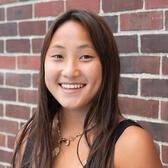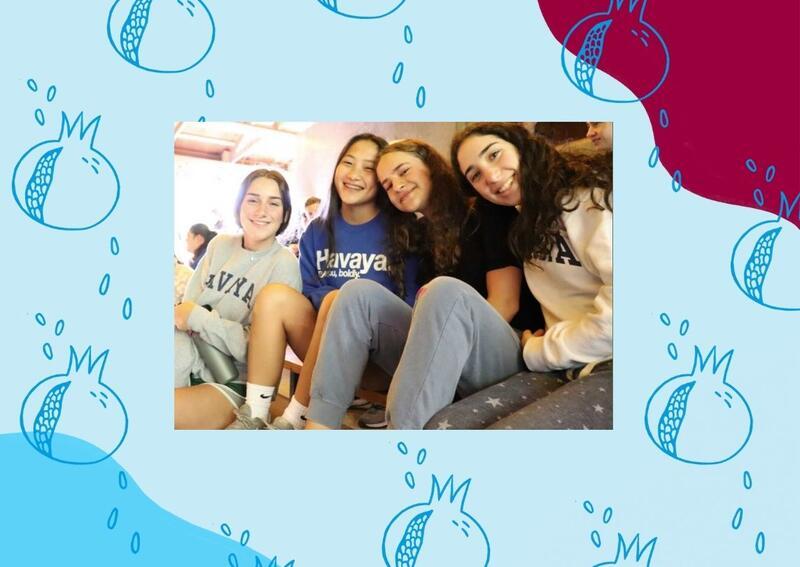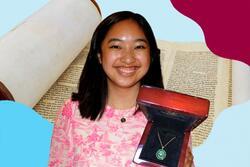Marking My Growth as a Feminist, Asian, and Jewish Woman with My Camp Shirts
I have twelve summers of Camp Havaya shirts. The shirts, which all sit in a special box in my room, are more than just colored cotton printed with slogans like, “Be You, BOLDLY”; they represent a timeline of my growth in the Jewish world. As a female-identified person, these shirts chart my maturation into a proud, strong Jewish woman. As a POC—and I don’t think I could write this piece without including that piece of my identity—they represent my understanding and appreciation of what being Chinese means. Receiving the t-shirts at the end of camp each summer marked my personal development throughout that year, and the collection of shirts I’ve acquired underscores how I grew into the person I am today.
Being an Asian adopted, Jewish woman is a lot—I write that and smile to myself. It isn’t a lot because of any one thing, but rather, due to how these identities all work together and sometimes conflict. It took seventeen years for me to find harmony between these identities—through a combination of being comfortable with each of my identities and understanding how each of them separately add to my life.
As I consider my collection of camp t-shirts, it's clear to me that the t-shirts that most represent my Asian, Jewish self are those that I received from when I was five until I was eleven. During those early years at camp, I was learning what parts of Jewish life felt good to me, and what parts I didn’t feel so comfortable with. My family is less observant than my camp program, so while at camp, I learned how to pray and value Jewish ritual traditions. I started to look to Shabbat as a celebration of my week, and singing “shavua tov” gave me a chance to focus on the excitement of the week ahead.
During those years, I learned about Jewish rituals and traditions and how they applied to me—and how they sometimes just didn’t. I heard about Ashkenazi Jewish life and felt that, sometimes, that culture wasn’t a representation of who I was as a Jew. I remember at one of our middot (Jewish learning sessions), a rabbi put up a photo of a Holocaust victim and said, “You can see yourself in her.” I looked at this white European-looking person and thought to myself, I don’t see myself in her at all. That was where I first started to develop my understanding of what it meant to be Jewish and also something “else.”
The shirts I got from ages eleven to fifteen represent my feminist identity and that part of me. During those years, several amazing women were my counselors. They taught my friends and me that there were truly no limits to our greatness—that being friends and supporting one another was, and still is, far more important than being a mean girl or creating "in" and “out” groups. These women taught me that respect for myself, as well as for the other people in my life, is of the utmost importance. They (appropriately) shared examples from their lives and truly showed me the meaning of feminism: despite our differences in clothing, athletic ability, academic triumphs, or even ideas, we could make womankind stronger by listening to and understanding each other. My notion of “my village” began there, and I know it’ll continue throughout my lifetime. I realized that community is a gift that allows women to learn from and with one another, while building up our own separate activist identities.
My staff shirt represents the moment that I saw all of my identities come together. During the past eleven school years and summers, I'd been able to piece together my identity and I'd grown comfortable with the different Jewish, Chinese, and feminist components of myself when, previously, I’d let one overshadow the others. I now had a stronger grasp on the interdependence between my intersectionalities, and I also realized I could make a difference in the mindsets of those around me.
Using that foundation I'd built, I encouraged the girls in my cabin as their counselor to unite and support one another. Taking care of thirteen seventh and eighth grade girls was certainly a challenge, but my experiences with my counselors and my grounding in the Jewish values of camp helped me understand that this was the time to be me, "BOLDLY." I made myself vulnerable, sharing my stories of both triumphs and tribulations with these thirteen young people.
Some of my campers were gay, some were straight or bi, some were white, and some were POC like me. But the notion that every single person should be included and treated with care is the most basic tenet of all forms of activism, including feminism. My co-counselors and I were from different countries, of different ages, and came from different walks of life, yet we were able to facilitate a caring environment for these young people—which they’ll hopefully carry with them throughout the rest of the calendar year.
Upon reflection, I’m proud of all of the strides I’ve made in embodying my feminist values; however, I’m also aware of the fact that I’m only seventeen and still have a long way to go. There are many metaphorical t-shirts ahead of me; and I’m so excited to see what’s in store for me, as a bold Asian and Jewish woman.
This piece was written as part of JWA’s Rising Voices Fellowship.







